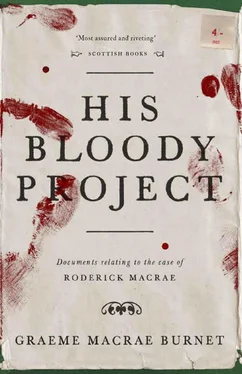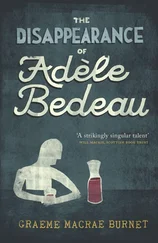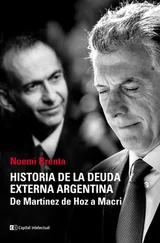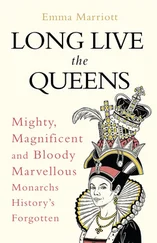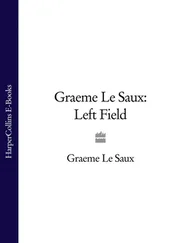Graeme Burnet - His Bloody Project
Здесь есть возможность читать онлайн «Graeme Burnet - His Bloody Project» весь текст электронной книги совершенно бесплатно (целиком полную версию без сокращений). В некоторых случаях можно слушать аудио, скачать через торрент в формате fb2 и присутствует краткое содержание. Год выпуска: 2015, Издательство: Contraband, Жанр: Современная проза, на английском языке. Описание произведения, (предисловие) а так же отзывы посетителей доступны на портале библиотеки ЛибКат.
- Название:His Bloody Project
- Автор:
- Издательство:Contraband
- Жанр:
- Год:2015
- ISBN:нет данных
- Рейтинг книги:5 / 5. Голосов: 1
-
Избранное:Добавить в избранное
- Отзывы:
-
Ваша оценка:
- 100
- 1
- 2
- 3
- 4
- 5
His Bloody Project: краткое содержание, описание и аннотация
Предлагаем к чтению аннотацию, описание, краткое содержание или предисловие (зависит от того, что написал сам автор книги «His Bloody Project»). Если вы не нашли необходимую информацию о книге — напишите в комментариях, мы постараемся отыскать её.
A brutal triple murder in a remote northwestern crofting community in 1869 leads to the arrest of a young man by the name of Roderick Macrae. There’s no question that Macrae is guilty, but the police and courts must uncover what drove him to murder the local village constable.
And who were the other two victims? Ultimately, Macrae’s fate hinges on one key question: is he insane?
His Bloody Project — читать онлайн бесплатно полную книгу (весь текст) целиком
Ниже представлен текст книги, разбитый по страницам. Система сохранения места последней прочитанной страницы, позволяет с удобством читать онлайн бесплатно книгу «His Bloody Project», без необходимости каждый раз заново искать на чём Вы остановились. Поставьте закладку, и сможете в любой момент перейти на страницу, на которой закончили чтение.
Интервал:
Закладка:
Towards the end of the summer, Lachlan Broad made it known that he intended to put himself forward for the soon-to-be vacant role of constable. It was unheard of for anyone to volunteer for this thankless position. Even those who might enjoy the authority the role bestowed knew better than to admit it. It was widely held that Lachlan Broad would relish the exercise of power over his neighbours and, for this reason, an alternative candidate was covertly sought. My father, though not well-liked, was respected in the community, and one evening a number of men, Kenny Smoke among them, visited our house to persuade him to allow himself to be put forward. My father asked each of the men in turn why, if they felt it was so important to oppose Lachlan Broad, they did not do so themselves. Each of the men had their own excuses for not doing so and by the time the last of them had spoken, my father had no need to declare his refusal. The fact was that the meeting between Lachlan Broad and the factor, whether real or imagined, had led to the perception that he was the factor’s man, and for no other reason than this, no one wished to put himself up against him. In the end the only person who could be persuaded to stand was Murdo Cock, an imbecile who lived in a hut in Aird-Dubh and was said to survive on a diet of sowens and limpets.
The vote was held at the manse in Camusterrach. On the appointed evening the men of the three villages filed in, their caps stuffed in the pockets of their jackets or clasped in front of them. Reverend Galbraith greeted each of the men as they entered, making general enquiries after their families and remarking on any recent absences from the kirk. The atmosphere was subdued. The factor stood flanked by the two candidates and briefly addressed the assembled company. He thanked them for their attendance and reminded them of the importance of the role of the constable in the happy management of the estate. He commended neither man, noting only their public-spiritedness in standing and expressing his confidence that the men would choose the most able candidate. Reverend Galbraith then took the opportunity to lead the men in prayer. When it came to the vote, not one man raised their hand to oppose Lachlan Broad.
Broad was not long in exercising his new powers. One evening shortly after his appointment, he paid a visit to our house. Jetta was just after putting away the crockery from our meal and had taken up her knitting. Father was in his chair by the window. I had remained at the table. It was still light and I had been staring out of the open door for some minutes, watching Lachlan Broad and his brother approach. It was only when they had passed our neighbour’s house that I realised they intended to call on us and by that time it was too late to alert my father to their imminent arrival. Broad’s large frame filled the doorway. He did not utter any greeting and I believe it was the alteration in the light which led my father to look up from his book. At this point, the new constable bid us good evening. My father stood up, but made no pretence of welcoming him. Aeneas Mackenzie remained outside, with his arms folded as if to stand guard against any intruders. Lachlan Broad took one or two steps inside the house and announced that, in his recently acquired capacity, he was visiting all the households under his jurisdiction.
My father said in a sly tone, ‘So we are now under your jurisdiction, are we?’
Lachlan Broad replied, ‘You are under the jurisdiction of the laird, and since his factor is entrusted with the management of the estate and I am now the representative of the factor in these townships, then, yes, you are under my jurisdiction.’
He then gestured towards the table with his right hand and said, ‘Am I not to be welcomed into your house?’
My father indicated that he should take a seat and instructed Jetta to take her knitting elsewhere, but he did not offer Broad a refreshment as he would to another visitor. Lachlan Broad watched Jetta withdraw to the back chamber before taking a seat on the bench and bidding me good evening. I returned his greeting in as civil a manner as I could muster, as had I said what was truthfully in my mind, he would surely have levied a fine against us.
When my father had taken his place at the head of the table, Lachlan Broad began by stating that he was gratified to have gained the support of the community in securing the position of constable. He then discoursed at some length on the responsibility of individuals to comply with the terms of their tenancies. The regulations, he said, did not exist for the amusement or profit of the laird, they were for the benefit of everyone in the community. ‘If there were no regulations,’ he said, ‘we would be living in a state of anarchy, would we not?’
As he spoke he drummed the middle three fingers of his right hand on the table, so that they made a sound like the distant galloping of a pony. His fingers were thick and chafed, the nails chipped and ingrained with dirt. Throughout his speech, his gaze remained fixed somewhere between the top of the dresser and the roof-trees as if he was addressing a parish meeting. He paused for a few moments as if to give my father an opportunity to respond, but when he did not do so, he continued.
He was of the opinion that, of late, our community had brought shame upon itself through its lack of adherence to the regulations, and by the laxity with which they had been enforced. We had been behaving, he said, like schoolchildren when the teacher’s back is turned, and had been indulged in this by an authority who, in wishing too much to be liked, had ill-served his community. However, he took his election as constable as a sign that the people wished to mend their ways. He was thus taking the opportunity to remind all tenants of their responsibilities under the terms of their leases. If things did not change for the better, measures would have to be taken. He was silent for a few moments before adding, as if as an afterthought, that he spoke with the full authority of the factor.
My father’s expression had not altered since the beginning of Broad’s speech. But he now took his pipe from his mouth and set about refilling it from his pouch. This done, he lit it and took a few slows puffs.
‘You have no call to remind me of my responsibilities, Lachlan Mackenzie. I have never transgressed any regulations and have never had a black mark placed against my name.’
‘I regret to say, Mr Macrae, that your response only confirms the state of anarchy into which we have lately fallen, such that we have so disregarded the regulations we no longer know when we are breaking them.’ He then added, ‘In any case, it is not for you or anyone else to know whether there are black marks against their name.’
My father puffed steadily on his pipe. It was rarely possible to know what he was thinking, but at that moment I sensed from a certain hardness in his eyes that he was displeased. Lachlan Broad’s fingers ceased their drumming and he placed his left hand, which until then had been resting on his lap, flat on the table. I interpreted this action as a sign that he meant to stand up and take his leave, but he did not do so. Instead, it transpired that his remarks up to that point had been a mere preface to the real purpose of his visit.
‘Aside from these generalities,’ he said, ‘there is an additional matter which concerns your household in particular.’
His fingers resumed their drumming. I assumed he was about to re-open the matter of the killing of the sheep and use his newly-acquired powers to increase the fine against my father, or at least demand its immediate payment. But in this I was mistaken.
‘It has been decided,’ he continued, ‘that the extent of your croft should be reduced.’
My father’s expression did not alter.
Читать дальшеИнтервал:
Закладка:
Похожие книги на «His Bloody Project»
Представляем Вашему вниманию похожие книги на «His Bloody Project» списком для выбора. Мы отобрали схожую по названию и смыслу литературу в надежде предоставить читателям больше вариантов отыскать новые, интересные, ещё непрочитанные произведения.
Обсуждение, отзывы о книге «His Bloody Project» и просто собственные мнения читателей. Оставьте ваши комментарии, напишите, что Вы думаете о произведении, его смысле или главных героях. Укажите что конкретно понравилось, а что нет, и почему Вы так считаете.
